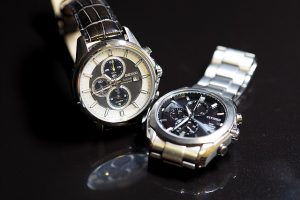A relatively new trend is spreading across the globe – smartwatches. We use them to control our phones, track our goals, get info on the weather, as well as any notifications we are signed up for. Does this mean that the classic watch industry is dying out? As it happens, not really.
Smartwatches

Smartwatches, though popular now, are not a new concept. The first wearable computers were in the market in the 80s and 90s, though we would not give them the credit of being smart. Seiko was the pioneer in 1984 and led the charge in the race for the perfect combination of computers and phones you would wear on your wrist in 1999.
Pebble introduced its namesake on Kickstarter in 2012, hoping to create a product that could copy the features of the smartphone. This led to the first smartwatches by Apple and Samsung in 2015.

Advantages
Smartwatches offer silent notifications, meaning that, when properly configured, you will get an update on the important conversation you are having with a client, or an email you have to read urgently, without the incessant beeping of your acquaintance on Facebook posting yet another selfie.
They are your companion on the road during your physical activities, like jogging and cycling. You can keep track of your vitals wherever you are and plan your activities or doctor’s appointments accordingly.
Disadvantages
While wearable tech is awesome, there is the issue of yet another device that needs to be regularly charged. They also have a relatively short lifespan for the electronics – within a year or two, you are going to have to replace it, either because the components become run down, or because the hardware/software combo on your wrist becomes obsolete. Being a watch also means that you have a small screen to relay all the necessary info you are hoping to get out of it.

Classic Watches
This classic look never goes out of style. Yes, you are going to seem old-fashioned for not having a watch that can tell you the humidity levels outside, but you are going to have a classy marvel on your wrist with the design and the mechanics that have survived for literal centuries.

If cared for properly and acquired from a trustworthy vendor, a classic watch can live as long as you do. The problem arises in the fact that many people don’t care properly about their watches, shortening their lifespan. High-quality Quartz watches are also expensive, which is why some opt for not having a watch at all.
Future of the Industry
Smartwatches are definitely going to develop more and become stronger with better features. That being said, the classic watch is also going to always be there, providing simplistic, yet practically immortal, mechanism of telling time.

